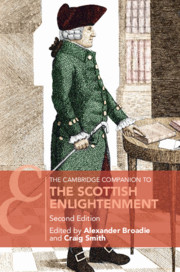Book contents
- The Cambridge Companion to the Scottish Enlightenment
- Series page
- The Cambridge Companion to the Scottish Enlightenment
- Copyright page
- Contents
- Contributors
- Acknowledgements
- Chronology of Events Relating to the Scottish Enlightenment
- Introduction
- 1 Several Contexts of the Scottish Enlightenment
- 2 Religion and Rational Theology
- 3 The Human Mind and Its Powers
- 4 Anthropology
- 5 Science in the Scottish Enlightenment
- 6 Scepticism and Common Sense
- 7 Moral Sense Theories and Other Sentimentalist Accounts of the Foundations of Morals
- 8 The Political Theory of the Scottish Enlightenment
- 9 Political Economy
- 10 Natural Jurisprudence and the Theory of Justice
- 11 Legal Theory in the Scottish Enlightenment
- 12 Sociality and Socialisation
- 13 Historiography
- 14 Art and Aesthetic Theory
- 15 Literature and Sentimentalism
- 16 The Impact on America
- 17 The Nineteenth-Century Aftermath
- Select Bibliography
- Index
- Series page
2 - Religion and Rational Theology
Published online by Cambridge University Press: 04 October 2019
- The Cambridge Companion to the Scottish Enlightenment
- Series page
- The Cambridge Companion to the Scottish Enlightenment
- Copyright page
- Contents
- Contributors
- Acknowledgements
- Chronology of Events Relating to the Scottish Enlightenment
- Introduction
- 1 Several Contexts of the Scottish Enlightenment
- 2 Religion and Rational Theology
- 3 The Human Mind and Its Powers
- 4 Anthropology
- 5 Science in the Scottish Enlightenment
- 6 Scepticism and Common Sense
- 7 Moral Sense Theories and Other Sentimentalist Accounts of the Foundations of Morals
- 8 The Political Theory of the Scottish Enlightenment
- 9 Political Economy
- 10 Natural Jurisprudence and the Theory of Justice
- 11 Legal Theory in the Scottish Enlightenment
- 12 Sociality and Socialisation
- 13 Historiography
- 14 Art and Aesthetic Theory
- 15 Literature and Sentimentalism
- 16 The Impact on America
- 17 The Nineteenth-Century Aftermath
- Select Bibliography
- Index
- Series page
Summary
Religion was a central concern of the thinkers of the Scottish Enlightenment with David Humes sceptical engagement with religion earning him the reputation of being an infidel. Accordingly, this chapter falls into three parts. The first explores the state of the subject before Hume wrote, distinguishing between an orthodox tradition for which theology was the primary science that could dictate terms of reference to philosophy, and a new, largely imported (English and Dutch), tradition of rational religion that subjected the whole framework of religious belief to the same rational critique as other forms of knowledge and belief. With the context established, the second part of the chapter will concern Hume, represented especially by two essays in his Philosophical Essays (later called An Enquiry) concerning Human Understanding (1748), his Natural History of Religion (1757), and his Dialogues concerning Natural Religion (first published in 1779 but known to some in manuscript from the 1750s). His Treatise of Human Nature (1739-40) was the seminal work that first presented his sceptical philosophy and its supporting psychology, and it had implications for religious as for any other belief; these implications were suppressed prior to publication, but were not lost on contemporaries who expected an analysis of the human mind to culminate as a matter of course in an account of the foundations of religious belief. The final part of the chapter will summarise the Scottish and English response to Hume in the debate over a rational theology. In his appraisal of arguments for the existence and attributes of God, and arguments about the credibility of ancient revelation, Hume s philosophy almost inevitably brought him into conflict with ministers of the Kirk.
- Type
- Chapter
- Information
- The Cambridge Companion to the Scottish Enlightenment , pp. 33 - 59Publisher: Cambridge University PressPrint publication year: 2019
- 5
- Cited by

